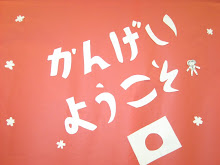Wednesday: September 16, 2009 A Block Two Day
JAPANESE 3 -- First period
This class does not meet on Block Two days.
New review test on verbs will be given Thursday, Sept 16. (Many people had difficulty with the last one.) The re-test will count for twice as many points as the last one. Today students received their tests, and rewrote them completely, with corrections、 in their notebooks.
After answering questions about characters in 3 Kimono (pages 4 and 5), students spoke in Japanese about their summer vacations.
We listened to tape for page 7 in text.
Explanation for talking about kanji:
Kanji compound example –人口
えい語 で いみ は Population という こと です。
かんじ は 「ひと」 の じん と くち の 「こう」 です。
On board:
Group 3 verbs:
かいもの します
すいえい します
じょうば します
さんぽ します
ランニング します
デモ します
サイクリング します
NOT Group 3 verbs:
はなします
かします
New nouns: しごと(Work)、アルバイト(Part-time or temp job)
とまります(Stay over night at hotel or someone’s house)
Kanji: 買います Keep an eye on your shell money when you BUY things
目 Eye
貝 Shell
見 An eye on legs SEES
Homework: a family tree of the Weasley family (from the Harry Potter series), at the time that Harry is 16 years old (i.e., everyone is still alive)
INDEPENDENT STUDY JAPANESE – Third period
Independent Study did not meet today.
JAPANESE 1 – Fifth period
Handed back test on hiragana a, i, u, e, and o, plus n(g). Students did much better this time. Students who received a grade below C must retake the test.
Homework is to complete pages 20 and 21 in the workbook, and write all words in ROMAji (Hepburn Romanization), using the new hiragana charges.
Random House Japanese-English, English-Japanese Dictionary was handed out to students today.
.
JAPANESE 2 -- Sixth period
Verb retest took place today.
Kanji practice sheets from Genki: An Integrated Course in Elementary Japanese (the workbook) were handed out today. Everyone did some writing, and we will discuss tomorrow
Handed out 2Kimono text.
Reminder: We all must be polite in the Japanese language classroom. Not only is it important in our lives in general – it is an essential part of Japanese culture. ください、おねがい します、ありがとう、すみません Are the most important words and phrases in Japanese.
JAPANESE 4 and AP – Seventh period
Visitors today:
Akari Rokumoto from Chicago’s City of Osaka Office
Yuuka Katashima, 22 years old, a resident of Kobe who won Osaka’s annual English contest and is visiting Chicago, as part of her prize.
They performed the kamishibai, Kasa Jizo (The Hats of the Jizos).
Then they involved students in the traditional game, JanKen, as it is played in the Osaka area.
Then students wrote simple sentences, traded them, and acted them out. Finally, the sentences were combined into complex sentences.
ねこ は あそびます。
えんぴつ が うたう。
さかな を 食べる。
犬 が 読みます。
Combined into two sentences:
「さかな を 食べる」という 本 を 犬 が 読みます。
ねこ は えんぴつ が うたう の を 見ながら あそびます。
Combined into one sentence:
えんぴつ を 食べた さかな と ねこ が うたって、読める いぬ と あそびます。
Homework:
1. Using information you developed with categories from page 36 of Nakama Two, write 4 conversations (as per the pattern on the page) --explaining the “things I want to do but can’t, 4 reasons that come from the “sickness” expressions, and four things it would be good to do in this situation. Be ready to talk!
2. Bring handed-out narrative to class so that we can work on it tomorrow.
Useful website for vocabulary: search for Denshi Jisho in Google, has vocab and also information on each kanji constituting a word.
REMINDER: we must realize something important. In doing high school assignments or college assignments or tasks out in the world, every one of us should be trying to do the best and most complete work possible, not the least possible.
You might like to work with the following kanji-learning website:
http://www.jpf.org.uk/language/kanjifiles/kanjicard.html
About Me

- O.Kimeru
- M.A. 1992 from U. of Chicago; Japan Foundation Fellow in 1987-88; research fellow Yokohama City University; Japanese language teacher since 1991; also taught French (member American Association of Teachers of French), English as a Second Language (to students), methodology of teaching ESL (to Japanese high school teachers), English, Japanese history/culture, drama; in 2002 and 2004, listed in Who's Who Among America's Teachers; member of Chicago Sister Cities Osaka Committee, and chair of its Education Sub-Committee; vice-president Illinois Association of Teachers of Japanese; Payton H.S. World Language Department Chair from 2003-2007, under founding principal Mrs. Gail Ward; taught Japanese and coordinated Japan Exchange at Payton from 2003 to 2010; Japanese teacher at Burr Public School beginning August, 2010
Followers
Blog Archive
-
▼
2009
(146)
-
▼
September
(19)
- September 29, 2009 An Eight Period Day
- September 28, 2009 An Eight Period Day
- September 25, 2009 An Eight Period Day
- Japan Exchange Seminar 2009/09/24
- September 23, 2009 A Block Two Day
- September 22, 2009 A Block One Day
- September 21, 2009 An Eight Period Day
- September 18, 2009 An Eight Period Day
- September 17, 2009 An Eight Period Day
- September 16, 2009 A Block Two Day
- September 15, 2009 A Block One Day
- September 14, 2009 An Eight Period Day
- September 11, 2009 An Eight Period Day
- September 10, 2009 A Block Two day
- September 9, 2009, Wednesday
- September 8, 2009, an Eight Period Day
- Requirements for Kimmel Sensei's Japanese Classes,...
- requirements for Japanese classes, revised Septemb...
- Fall Haiku for the Beginning of School
-
▼
September
(19)